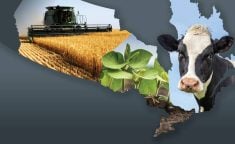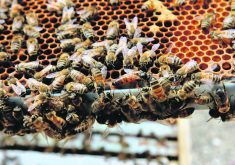Manitoba farmers praying for good crops might do well to ask for divine intervention to keep their biggest customer — the United States.
As U.S. President Donald Trump’s global trade war heats up, they could find their largest market for many of their products under fire.
During the last five years (2013-17) this province’s agricultural exports to the U.S. averaged $2.6 billion, accounting for almost 47 per cent of Manitoba’s total agricultural exports, federal and provincial statistics show.
That’s a lot eggs in one basket.
In 2017 Manitoba agricultural exports totalled $5.94 billion and $2.5 billion or 43 per cent of those revenues came from exports to the U.S.

“It’s (U.S. trade) a big deal for us,” Manitoba Agriculture Minister Ralph Eichler said in an interview.
“I’m optimistic and hopeful clear minds will prevail.”
No wonder. Of the top four agricultural exports from Manitoba to the U.S. last year — canola oil and meal ($728.8 million), processed potatoes ($394.3 million), live hogs ($231 million), processed pork ($229 million) and raw and processed oats ($191 million) — the U.S. was the No. 1 market, except for pork, where the U.S. was second only behind Japan.
Almost all of Manitoba’s total canola oil — 92 per cent — went to the U.S in 2017.
It was much the same for Manitoba’s processed potatoes (96 per cent), live hogs (95 per cent) and oats (93 per cent), underscoring just how dependent some Manitoba products are on our increasingly bellicose neighbour to the south.
Read Also

University of Manitoba honours three agriculture alumni
Cathey Day, Fred Greig and Kim McConnell were chosen for the University of Manitoba’s 2025 certificates of merit from the agricultural and food sciences faculty.
The U.S. was also Manitoba’s No. 1 wheat customer in 2017. U.S. sales worth almost $118 million accounted for a third of the province’s total wheat exports.
Although Trump has repeatedly complained Canada’s supply management system unfairly restricts American dairy products, and more recently our grading system discriminates against American wheat, he hasn’t threatened import tariffs on Canadian agri-food — yet.
But all bets are off as an all-out trade war looms between the U.S. and the rest of the world.
On July 1 Canada upped the ante retaliating with $16.6 billion worth of tariffs on many American imports ranging from kitchen appliances and lawn mowers, to ketchup, pickles, Jack Daniel’s, and toilet paper in retaliation to Trump’s dubious 25 and 10 per cent tariffs on imported Canadian steel and aluminum, respectively. He used an obscure law allowing the president to restrict imports that threaten national security.
Canada, a staunch U.S. ally, says claims of a security threat are absurd and is fighting the tariffs under NAFTA and through the World Trade Organization (WTO).
Last week, the U.S. imposed $34 billion (U.S.) of import tariffs on Chinese goods, with China responding in kind, including tariffs on U.S. soybeans and pork.
Trump has promised to protect American farmers, likely with subsidies, which would hurt other countries’ farmers and could spark more trade action against the U.S.
Meanwhile, American hog farmers, already suffering from lower prices due to retaliatory Mexican import tariffs, are predicting even lower returns.
Manitoba hog producers are being hit too.

“All our (hog price) formulas are based on the American national base price,” Manitoba Pork Council general manager Andrew Dickson said.
“Bottling up all the pork in the U.S. all it’s going to do is drop the price to catastrophic level.”
Meanwhile, trade uncertainty is casting a pall over investment in new Manitoba hog barns.
“There is no question it has hurt markets because of the market uncertainty,” Dickson said. “The market has already discounted this Mexican thing. All the prices have come down for the fall.”
The U.S. and Canadian hog sectors are so integrated due to the North American Free Trade Agreement (NAFTA) and the Canada-U.S. Trade Agreement (CUSTA) before that, it’s hard to believe import tariffs would be imposed by either side, Dickson said. But trade wars come with unintended consequences.
Manitoba exports 2.5 million to 2.9 million weanling hogs to U.S. to be fed to slaughter weight. Some of that pork is exported back to Canada.
Of the $1.25 billion of American agricultural goods Manitoba imported last year, processed pork placed second on the list with a value of $101.7 million.
American soybean meal worth $113.6 million topped the list. Corn was fifth at $58.5 million.
Predictions that Trump would become pragmatic after winning office proved wrong. He remains unpredictable and unswayed by facts. He has threatened a 25 per cent tariff on Canadian autos and parts, which would almost certainly spark Canadian retaliation.
Not only is Trump threatening to withdraw from NAFTA, but the WTO, which oversees international trade rules, which could make a global trade war worse.
Despite the gloomy outlook, many pundits agree it’s Trump’s negotiating strategy to try and bully adversaries into submission. It also plays well to his base, even though arguably a trade war hurt them too.
But quitting the WTO requires congressional approval and is widely opposed by U.S. business.
Trump’s tactics are unlikely to work, says Mike Gifford, a former Canadian chief agricultural trade negotiator who worked on the Uruguay Round of world trade talks, CUSTA and NAFTA.
“You just have to remain calm and not get flustered and that’s essentially what the Canadian government is saying,” Gifford said.
The Americans want Canada and Mexico to do all the compromising, Gifford said.
“You can’t sell a deal like that… ” he said. “There has got to be the perception that there’s a win-win in it. This is what Mr. Trump and (U.S. Trade Ambassador Richard) Lighthizer seem to ignore.”
All countries have agricultural sectors to protect. It’s supply management in Canada. In the U.S. it’s sugar, including beets, cane, corn and processors.
“That is one hell of a powerful lobby in Washington,” Gifford said. “When people blindly say Canadians should get rid of supply management, are the Americans going to get rid of their sugar program? It takes two to tango.”
Despite Trump’s actions, trade laws still exist, he said.
While the U.S. is Canada’s biggest agricultural export customer, total Canadian and Manitoba agricultural exports are more diverse than automobiles, which are exported almost exclusively to the U.S., Gifford noted
Internal allies
Also hopeful is the fact some of Trump’s biggest supporters — farmers — also want free trade. They’ve urged Trump “to do no harm.”
U.S. farmers earn 20 per cent of their revenue from exports. And China is a key U.S. customer having last year purchased US$14 billion of U.S. soybeans — a third of the U.S. crop.
“They are a vital trading partner, and we need to continue to do business with China without the sting of tariffs,” AgInsider reported Iowa farmer John Heisdorffer and president of the American Soybean Association, as saying last week.
Most state agricultural secretaries support trade too, Eichler said.
“They understand the importance of it,” he said.
“I have had a number of calls with my colleagues in the States and they’ve been very supportive so hopefully with their help they can help us convince the Government of the United States that we are beneficial to one another.”
Relationships are key, Eichler said.
No doubt former prime minister Brian Mulroney would agree. When CUSTA talks were about to collapse in 1987, Mulroney told U.S. Treasury Secretary James Baker he was going to phone president Ronald Reagan.
“I’m going to say to him, ‘Ron, I want you to explain to me how it is… the Americans have just concluded, a nuclear reduction treaty with their worst enemies, the Soviet Union, and you can’t conclude a free trade agreement with your best friends, the Canadians,” the Toronto Star reported Mulroney as saying in 2013.
“Baker says, ‘PM, can you give me 20 minutes?’”
Not long after a deal was struck.




















